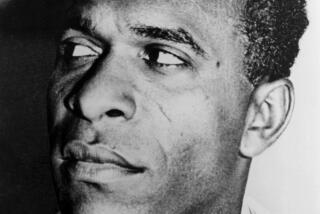The essential Auden
- Share via
Ts. eliot, who was born in St. Louis, spent all of his life escaping America and trying, in the footsteps of Henry James, to become an Englishman. Wystan Hugh Auden, whose 100th birthday would have just passed, was born in York, England,
and succeeded in the slightly more difficult task of becoming an American (or at the very least in transmuting himself from a Yorker to a New Yorker). In my opinion, the United States got the best of this exchange.
Auden had three of the qualities that make poets immortal. He wrote beautifully about love, movingly about war, and he was witty. On at least two occasions in the last decade or so, Americans have flocked to bookstores or switched on their browsers in order to read him -- often for the first time. The first occasion was the reading of his “Funeral Blues” in “Four Weddings and a Funeral.” The second was during the search for meaningful words after Sept. 11, 2001, when his long elegy for the 1930s, “1 September 1939,” with its lines about how “the unmentionable odor of death/offends the September night,” seemed to answer a need, as well as to mark the end of an epoch and the beginning of a different and more unpleasant one.
Though he had a Marxist phase in the 1930s, forming the stellar center of a group that included Stephen Spender, Christopher Isherwood, Cecil Day-Lewis and Louis MacNeice, Auden came to detest politics and especially the politicization of literature. He was interested in improving the private life, and I have always found it impressive that though his homosexuality was evident in “Funeral Blues,” it often cannot be deduced (as in the famous lines that begin “Lay your sleeping head, my love/Human on my faithless arm”) from many of his other poems. For him, being gay was a form of love, not a form of sex. What he wrote was for humanity.
Another celebrated Auden line -- “We must love one another or die” -- was annexed without his permission and used in Lyndon Johnson’s notorious attack ad on Barry Goldwater in 1964, showing a little girl counting petals as she mutates into a thermonuclear countdown. The hideous scene closes with Auden’s words. He was so furious at this that he removed the poem from his canon. He was prone to excise things that had been exploited or distorted, which is why “1 September 1939” -- the poem from which the line is taken -- can still be hard to get hold of. The same is alas true of “Spain 1937” and of his verse obituary for W.B. Yeats in 1939 -- three utterly magnificent works in the space of three years.
It is absolutely worth hunting down the early anthologies that include these poems. “Spain 1937” is a near-perfect evocation of how his generation had felt about the Spanish Civil War and about Spain itself (“that arid square/that fragment nipped off from hot Africa/soldered so crudely to inventive Europe”).
The obituary for Yeats (“Earth receive an honored guest/William Yeats is laid to rest,” he wrote) is a model of how to revere a writer with whom you have violent political disagreements.
Auden understood that a complete retreat from political life was impossible. He continued to review the public square, though increasingly from the standpoint of a skeptical Christian. In August 1968, when the Red Army rolled over Czechoslovakia, he composed the following exquisite miniature:
The ogre does what ogres can
Deeds quite impossible for man.
But one prize is beyond his reach
The ogre cannot master speech.
About a subjugated plain
Among its desperate and slain
The ogre stalks with hands on hips
While drivel gushes from his lips.
As Auden had written in the face of Hitler in 1939, “All I have is a voice/To undo the folded lie.” Yet a mere voice can still outlive an ogre. Only 21 years after he wrote those contemptuous lines about the Soviet army in Prague, it was words alone -- and poets and singers -- who brought down the edifice of falsehood and brutality that had been imposed on Prague. Sic simper tyrannis.
I end with a prediction. In 1947, the British Raj in India also came to an abrupt end. But freedom and independence came at the price of amputation, with the country hacked into two for the purpose of creating a post-colonial Muslim state in Pakistan. The carve-up was a hasty one, conducted by a British judge who had little knowledge of the territory.
“Unbiased at least he was when he arrived on his mission/Having never set eyes on this land he was called to partition,” as Auden sardonically opened his poem on this disastrous policy. Faced with “two peoples fanatically at odds.” the judge was:
Shut up in a lonely mansion, with police night and day
Patrolling the gardens to keep assassins away,
He got down to work, to the task of settling the fate
Of millions. The maps at his disposal were out of date
And the Census returns almost certainly incorrect.
But there was no time to check them, no time to inspect
contested areas. The weather was frightfully hot,
and a bout of dysentery kept him constantly on the trot,
but in seven weeks it was done, the frontiers decided,
a continent for better or worse
divided.
It may not be long, in other words, before American readers become Auden-conscious again, as they look for a poet who can express the tragedy of partitioning a faraway country.
More to Read
Sign up for our Book Club newsletter
Get the latest news, events and more from the Los Angeles Times Book Club, and help us get L.A. reading and talking.
You may occasionally receive promotional content from the Los Angeles Times.










